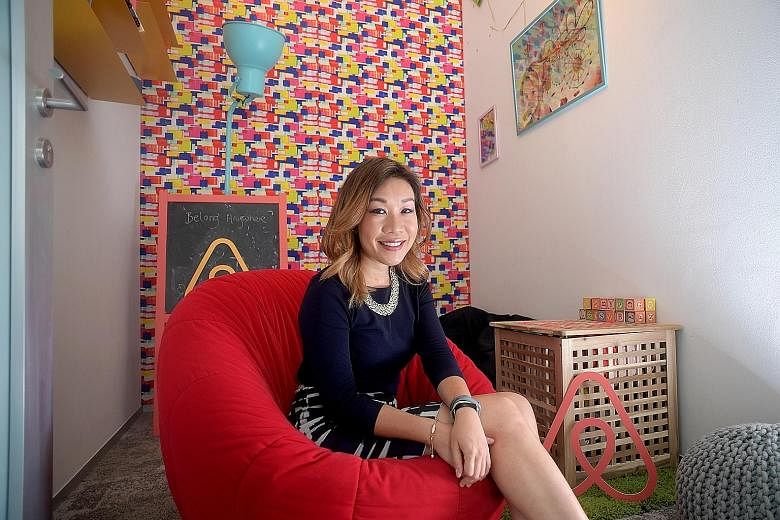It was a win for home-sharing firm Airbnb when Japan passed a law last Friday allowing owners to rent out properties on a short-term basis.
In Singapore, the firm is "very optimistic" that short-term rentals will also be legalised, said its country manager for South-east Asia, Hong Kong and Taiwan, Ms Robin Kwok.
Currently, it is illegal to rent out private homes or rooms for less than six months. Under Housing Board rules, the minimum subletting period for a flat is six months as well.
Officials have the right to force their way into private homes to check whether residents are renting them out illegally, under a new law passed in February.
This, however, has not stopped the practice. A search on the Airbnb website yesterday found more than 300 listings in Singapore.
With the Urban Redevelopment Authority studying the option of creating a category of private homes for short-term rentals, Ms Kwok, 38, remains confident that Airbnb can, and will, come up with a win-win solution with the authorities here.
Getting Japan to make home-sharing legal - it was previously banned in most parts of the country - had taken three years of working with the Japanese government "to come up with something that makes sense to them (the Japanese government)", she said.
-
1m
Estimated number of Singaporeans who have used Airbnb abroad.
260k
Estimated number of tourists who have been hosted here under Airbnb.
Home owners in Japan will have to abide by strict rules. For example, they can let out their property to paying guests for only up to 180 days per year. They are also legally mandated to respond promptly to any complaints from neighbours.
"It's the first time that home-sharing has been legitimised on a national level and I think it paves the way for other legitimisation wins across the Asia-Pacific," said Ms Kwok. Other countries and cities have also opposed Airbnb, which started in 2008, for the unwanted side effects it brings. These include inconsiderate guests, rising property prices and lack of housing for locals.
Airbnb has been in talks with more than 200 jurisdictions about its solutions to such issues. It has collated these discussions into a report to assist governments when they draft or amend rules related to home-sharing, said Ms Kwok.
In Singapore, where Airbnb set up its Asia-Pacific headquarters in 2012, the discussion has largely centred on the disamenities associated with transient strangers.
"We're getting ahead of these concerns by using technology and innovation," she said.
Last year, Airbnb launched a tool on its website that allows neighbours to write in with complaints that, if matched to an active Airbnb listing, will be forwarded to the host.
About one million Singaporeans have used Airbnb abroad, while 260,000 tourists have been hosted here. More than half of the hosts here share the homes they live in to earn a little extra income. The average Singaporean host rents out his space for an average of 41 nights a year, and earns $5,100 a year from it.
For now, the firm's share of the accommodation pie here appears to be minimal. According to the latest publicly available Singapore Tourism Board (STB) data, about 60 per cent of visitors stayed in hotels in 2015 while about 20 per cent stayed at the homes of friends or relatives. The remaining 20 per cent stayed in other accommodation options such as hostels, serviced apartments or homestays.
Ms Ong Huey Hong, director of hotels and sector manpower at the STB, said: "Homestays and other types of paid accommodation currently form a negligible part of overall accommodation receipts."
Ms Kwok, an American citizen who moved to Singapore in 2014, does not view hotels and hostels as Airbnb's competitors. She said 80 per cent of the listings here are outside of the main tourist areas, so travellers get to experience neighbourhoods they might otherwise never have seen and "a lot of these economic benefits are being distributed across the country".
"We actually don't think of this as a zero-sum game. For us to win, no one has to lose," she added. "I like to think of it as a 'share to win' approach where we are growing the travel pie, the travel market."


